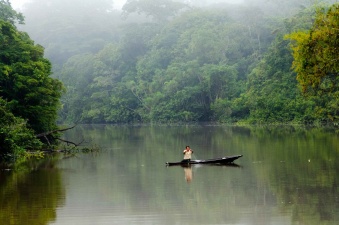 Research shows that if we aren’t able to stay the loss of ocean biodiversity, we could witness total ecosystem collapse.
Research shows that if we aren’t able to stay the loss of ocean biodiversity, we could witness total ecosystem collapse.
The loss of ocean predators such as Bluefin Tuna, which were given insufficient protection at a last year’s International Commission for the Conservation of Atlantic Tuna (ICCAT), and sharks – like those poached by Yemeni fishermen in the Red Sea – could very well end up in total collapse.
This news comes from research compiled by Brown University and the University of Washington, which reveals for the first time, with certainty, that past mass extinctions were caused by the depletion of “ecological redundancy.” And in the past, it took 10 million years for those ecosystems to recover.By studying carbon isotopes and a 50 million year fossil record, Jessica Whiteside and Peter Ward were able to determine that past mass extinctions were attributed to the loss of species variety in marine ecosystems.
The periods 250million years ago (Permian-Triassic) and 200 million years ago (Triassic-Jurassic) ended in extinctions of 90% and 72% of all life respectively. These were caused, it is believed, by an upsurge in volcanic activity that increased the presence of greenhouse gases in the atmosphere.
Many species were unable to adapt to the changing climate, which in turn altered the carbon cycle, leading ultimately to total system failure.
Currently, we are in the midst of the sixth mass extinction period, brought on mostly by human activity. Science Daily reports that a UN report entitled Global Biodiversity Outlook 2 demonstrates that between 1970 and 2000, one third of all species – land and marine – have gone extinct.
Some conservation efforts are paying off. The International Union for the Conservation of Nature (IUCN) have managed to ensure that more wetlands and marine ecosystems receive protection, but by and large, the loss of biodiversity continues to escalate.
And some zones are more vulnerable than others, depending on the kind of environmental and legal oversight afforded to them.
Even so, the Whiteside/Ward research published in Geology demonstrates that failure to maintain diversity could lead to a total collapse of marine ecosystems. It has happened at least twice before, and could happen again. No effort was made to speculate on how much diversity is necessary or how quickly collapse would escalate once set in motion.
Yet, the writing is clear: some kind of balance is necessary – a balance that allows us to maintain the fishing industries that sustain life, and to keep pursuing a valuable source of protein – but that puts a cap on fishing vulnerable species to satisfy a colossal and growing Asian appetite.
It may seem unfair to target foods that are germane to Asia, but that is not the issue. Everyone suffers when an ecosystem as complicated as oceans, and with as far ranging influence, fail.
More on vulnerable ocean species:
Protection Legislation Endangers Red Sea Sharks
Bluefin Tuna Debate Reaches Towering Heights Again
Clash Between Greenpeace and Bluefin Tuna Fishermen




In the past decade humans have added one BILLION to their numbers.
Without question we have overreached our carrying capacity.
As more carbon is poured in the air and absorbed by ocean waters causing them to become more acidic on the ph scale, will also cause an ecosystem collapse. The ocean temps are also warming. This does not bode well for a stable ecosystem.